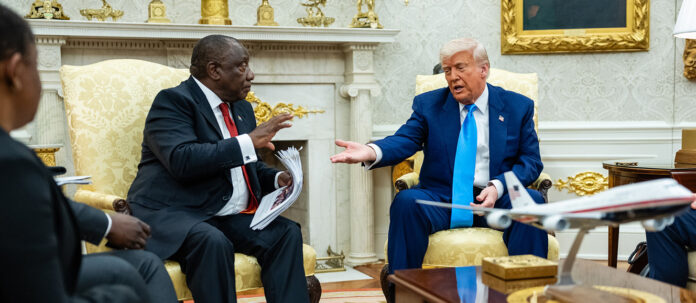In a rare shift of tone, U.S. President Donald Trump has publicly softened his stance on South Africa, refraining from incendiary claims of “white genocide” and instead characterising the country as going through “trials and tribulations.”
The surprising shift came during a farewell ceremony in the Oval Office on Friday for Elon Musk, who officially stepped down after a headline-grabbing 130-day stint as head of the Department of Government Efficiency (Doge).
Trump used the moment not only to heap praise on Musk, whom he called “one of the greatest business leaders and innovators the world has ever produced.”
“He’s already running one of the most innovative car companies in the world,” Trump said. “If you look at his factories and compare them with some of the old factories, it’s (sic) a big difference. Big, big difference.”
“He loves our country. He comes from another country—a country that’s going through, uh, trials and tribulations, I would say.”
It was a passing comment, but a significant one—especially in light of Trump’s prior insistence that white South Africans were being systematically targeted and killed, a narrative fuelled by right-wing lobbyists and widely condemned as misinformation.
Gone were the condescending tweets and Fox News-style talking points. In their place was a more restrained assessment—one that subtly acknowledged complexity over conspiracy.
Just ten days earlier, President Cyril Ramaphosa had been in Washington on a high-level diplomatic mission to reset strained relations between the two countries. The visit was anything but smooth.
The meeting started warmly, with Ramaphosa presenting Trump with a glossy collector’s book on South African golf courses, flanked by legends Ernie Els and Retief Goosen.
But what began in diplomacy quickly spiralled into political theatre.
Trump dimmed the lights in the Roosevelt Room and played a five-minute video montage of struggle-era songs and speeches by opposition figures such as Julius Malema and Jacob Zuma.
Among them was the chant “Kill the Boer,” which Trump cited as proof of racial hatred against Afrikaner farmers.
He also presented photographs claiming to show mass graves of white South Africans, one of which was later identified as a memorial from the Democratic Republic of Congo.
Ramaphosa, known for his measured temperament, pushed back. He explained that crime in South Africa affects all citizens, regardless of race, and warned that such alarmist narratives only deepened racial divisions.
Joining Ramaphosa were Justice Minister Ronald Lamola, DA leader John Steenhuisen, and billionaire Johann Rupert. Rupert’s plea for U.S. technological support, particularly Starlink internet and drone surveillance, focused on combating rural crime in a broader, more balanced context.
Reactions in South Africa were split.
Some praised Ramaphosa’s diplomatic poise under pressure; others questioned the optics of including ultra-wealthy figures while millions of South Africans face daily hardship.
The Trump administration’s hostility towards South Africa had included the expulsion of its ambassador and the initiation of a refugee programme specifically for white South Africans.
Many analysts attributed these actions to pressure from groups like AfriForum, which have lobbied U.S. conservatives using emotionally charged narratives of “white genocide.”
Ramaphosa’s team insisted such lobbying distorted reality and harmed both countries’ interests.
Which is why Trump’s more tempered words during Musk’s farewell were so striking.
“Elon is really not leaving,” Trump said. “He’s going to be back and forth. It’s his baby. I think he’s gonna be doing a lot of things, but Elon’s service to America has been without comparison in modern history.”
Visit SW YouTube Channel for our video content



